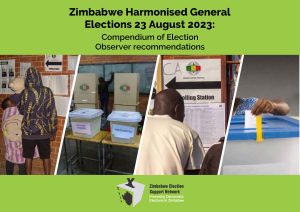This Factsheet is based on a summary of concerns and recommendations by several International, regional and local election observation missions who observed the 2018 Harmonised elections in Zimbabwe. The electoral concerns and recommendations are captured under the theme ‘Electoral Framework’ in the 2018 Compendium of Election Observers Recommendations and the ZESN 2018 Harmonised Elections Report. This is a general comment on ZEC’s mandate of voter’ registration under section 239 of the 2013 Constitution of Zimbabwe….more
ZESN FACT SHEET ON VOTER REGISTRATION
ZESN Fact sheet on Legal Framework
In the past many complaints have been made about the way in which elections have been conducted and there has been increasing pressure to implement significant reforms to the electoral framework to ensure the electoral processes are not manipulated and abused and to ensure that there are genuinely free and fair elections. Proposed reforms include measures:
- to enhance the independence and impartiality of the electoral management body;
- to facilitate unimpeded peaceful political campaigning in the lead up to elections…. more
ZESN Fact sheet on Delimitation of Electoral Boundaries
Delimitation is the process of dividing constituencies for the purposes of elections. It divides the country into constituencies and wards for the purposes of elections of persons to constituency seats in the National Assembly and of councilors to local authorities. It is important to note that delimitation is a fundamental process of the Electoral Cycle. The importance of demarcating boundaries is important in ensuring fair representation of the electorate. Delimitation is a technical process hence it is important that it is understood by all stakeholders….more
ZESN Fact sheet on Electoral Justice
Electoral justice, involves the means and mechanisms available in a specific country for ensuring that each action, procedure and decision related to the electoral process complies with the legal framework; protecting or restoring electoral rights; and giving people who believe their electoral rights have been violated the ability to file a challenge, have their case heard and receive a ruling…more
ZESN Fact sheet on Accountability of Security Forces, Traditional Leaders, and Civil Servants in Electoral Processes
Background Information
Elections should be conducted in a transparent manner that yields credible and indisputable results. However, election administration in Zimbabwe has in practice been marred by malfeasance from political incumbents and state institutions. Among the most contentious issues are the roles played by three critical state/national institutions: traditional leadership, the security sector and the civil service which have an obligation to be accountable to the Constitution which forbids them from being aligned to any political party…more
ZESN Factsheet on Fundamental Freedoms
The term fundamental rights refers to basic human entitlements or rights aimed at protecting and promoting specific interests of people. These rights are often times identified and entrenched in a country’s Constitution. in Zimbabwe, Chapter 4 of the Constitution of Zimbabwe Amendment (No. 20) Act, 2013 (‘the Constitution’) contains the Declaration of Rights which sets out the various fundamental rights recognised in Zimbabwe…more
ZESN Factsheet on Electoral Suffrage
The Constitution establishes a multi-party democratic political system with “universal suffrage and equality of votes”. Every five years elections are held to elect a President, parliamentarians, and members of local councils. Suffrage means the right to vote in elections…more
ZESN Factsheet on Elections Observation
Election observation is a process of systematically gathering information on
the electoral process in order to make an informed decision on the integrity and credibility of the process. This implies limited direct intervention into the actual electoral process by observers (whether local or international)…more
ZESN ON CONSTITUTIONAL AMENDMENT BILL (No.2)
On 31 December 2019, the Government of Zimbabwe (GoZ) published the Constitution of Zimbabwe Amendment (No.2) Bill (hereinafter the Constitutional Bill) in the Extraordinary Government Gazette. This formally commenced the special procedure to amend the Constitution of Zimbabwe.
The process stalled following the emergence of the COVID-19 pandemic and public health regulations under which a national lockdown was imposed. Parliament has announced that public consultations are resuming…more
ZESN Report on the 2000 Parliamentary Elections
This report is an account and analysis of events, which took place in Zimbabwe before, during and after the 2000 Parliamentary General Elections held on 24-25 June 2000. The information in this report has been collected by individuals and organisations from different sectors of Zimbabwean society. Information about what actually occurred at polling stations was collected by ZESN monitors some of whom were appointed by the ESC and accredited by the Registrar General…:more
